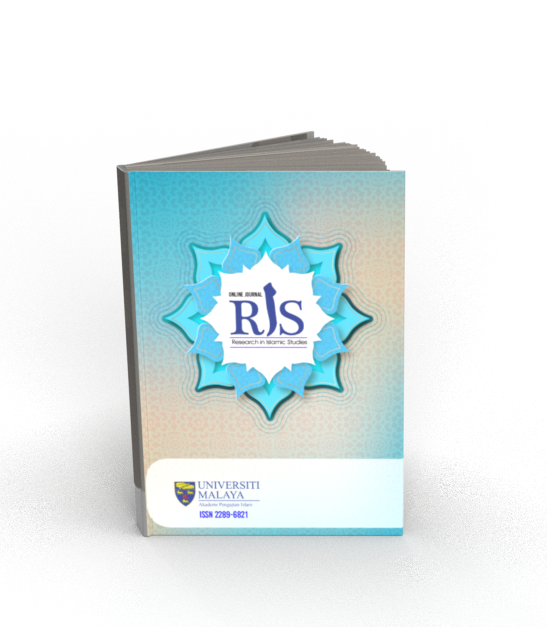دلالة "محتمل" عند المحدثين دراسة تطبيقية الإمام البخاري أنموذجا
Implication of "Muhtamal" Among Hadith Scholars: An Applied Study Imam Al-Bukhari as a Model
DOI:
https://doi.org/10.22452/ris.vol10no1.8Keywords:
study, applied, muhtamal, al-Bukhari, termAbstract
Imam Al-Bukhari, may Allah have mercy on him, is considered one of the respected scholars in the field of "Jarh wa Ta'dil" (the science of criticizing and evaluating narrators). He distinguished himself from his contemporaries by his use of precise and meticulous terminology in the field of Jarh (criticism), which reflected his high standards and expertise in this area. One of the unique terms he used was "Muhtamal" (possible) to describe certain narrators. Since this term was not included by other scholars in the hierarchy of Jarh wa Ta'dil terminology, I conducted research on this subject and I titled it as " Implication of "Muhtamal" Among Hadith Scholars: An Applied Study Based on Imam Al-Bukhari's Model." To clarify the implication of this term on the narrators identified by Al-Bukhari, I provided a conceptual explanation of the term "Muhtamal" in both language and technical usage. Then, I compiled a list of narrators whom Al-Bukhari described as "Muhtamal" and provided a detailed analysis of these narrators, including the opinions of other scholars regarding their reliability, whether there were differences of opinion or a consensus on their weakness. Finally, I determined the ranking or status of these narrators according to Al-Bukhari's assessment. Some of these narrators were labeled as "Muhtamal" without any additional qualification, while for others, Al-Bukhari used this term along with specific remarks. In his Sahih (authentic) collection, he mentioned that some of them were "Muhtamal." By examining the statements of other critics and evaluators, it became evident that opinions varied regarding the reliability or weakness of these narrators. Some scholars considered them trustworthy, albeit prone to error or confusion, except in cases like Sa'id ibn 'Abdul-'Aziz, where Al-Bukhari explicitly stated, "There is a consideration about him that cannot be possible." It became clear that his hadith narration was disregarded. Additionally, I clarified the explanation provided by Al-Khattabi in his definition of "Sahih" (authentic), stating that it refers to a hadith with a connected chain of narrators whose reliability has been verified, and the ability to independently verify it is possible. This suggests the possibility of corrections being made in later eras. I concluded the research by discussing the importance of the concept of "Muhtamal" possibility in uncovering reasons. The objective is to identify the terms used in the field of Jarh wa Ta'dil that were not explicitly mentioned by other scholars in their classifications. Additionally, the aim is to examine the implications of the term "Muhtamal" in Al-Bukhari's remarks regarding certain narrators. There are three main methodologies in formulating this research: inductive, analytical, and deductive approaches. As a result of this study, it was found that the term "Muhtamal" used by Al-Bukhari lowered the status of narrators from those who were described as "Thiqa" (trustworthy) to those who were described as "Sadooq" (truthful) with the addition of errors, illusions, or weak memory. There is also the possibility of adding terms within the hierarchy of Jarh wa Ta'dil that carry the description of "Muhtamal as-Sidq" (possibly truthful) or "Muhtamal ad-Da'af" (possibly weak(. One of the conclusions drawn from this research is the possibility of adding terms to the hierarchy of Jarh wa Ta'dil (criticism and evaluation) and the possibility of corrections and weakening in later eras.
Downloads
Downloads
Published
How to Cite
Issue
Section
License
Copyright (c) 2023 Online Journal of Research in Islamic Studies

This work is licensed under a Creative Commons Attribution-NonCommercial-ShareAlike 4.0 International License.
Copyright Notice
By submitting manuscripts to the Online Journal of Research in Islamic Studies (RIS), authors agree to transfer copyright to the journal. However, authors may republish their work or grant others permission to republish it; in which case it should be accompanied by a proper acknowledgment that the work was originally published in the Online Journal of Research in Islamic Studies (RIS). The journal adopt CC-BY-NC licence which authors may also share and distribute their article anywhere of non-commercial website, social media and repositories immediately on publication.
Authors may also reuse the Abstract and Citation information (e.g. Title, Author name, Publication dates) of their article anywhere at any time including social media such as Facebook, blogs and Twitter, providing that where possible a link is included back to the article on the journal site.












